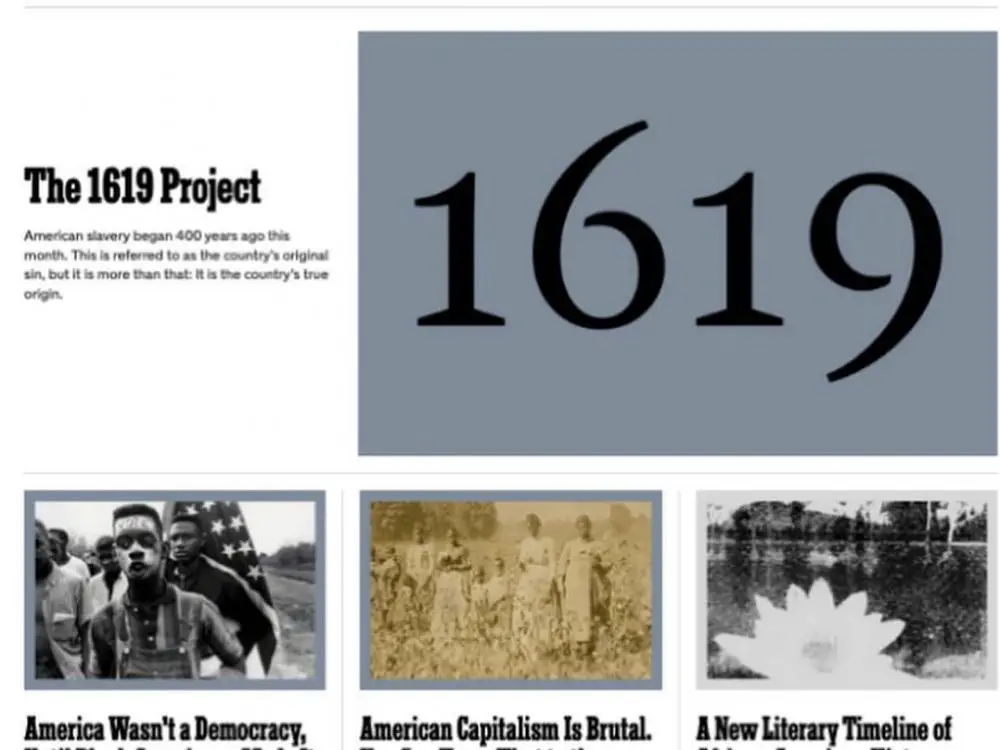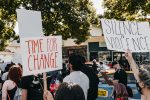Misunderstood people subjected to violence, enslavement and systemic racism. With the hope of a better life and existence, they toiled for those who didn’t care for them. They built the nation that we love and now call home — Black Americans have influenced almost every aspect of our daily life.
From our music, to the way we dress and to our love of certain foods, without their culture, we wouldn’t have a culture to appropriate.
For too long their history has been relegated to a month or a single holiday, where we all say “Thank you, Dr. King” and continue on with our day.
One project aims to change that and it is being met with tons of controversy.
What is the 1619 Project?
The 1619 Project is a revolutionary way of telling the story. The interactive project directed by Nikole Hannah-Jones prides itself on shifting our framework of American history.
“In August of 1619, a ship appeared on this horizon, near Point Comfort, a coastal port in the English colony of Virginia,” the project states. “No aspect of the country that would be formed here has been untouched by the years of slavery that followed … It is finally time to tell our story truthfully.”
In collaboration with The New York Times Magazine, the project began in August 2019, the 400th anniversary of the beginning of American slavery.
By reframing the narrative, the 1619 Project has dug deeper into the consequences of slavery and the contributions that Black Americans have made to the United States.
“Our democracy’s founding ideals were false when they were written. Black Americans have fought to make them true,” says Hannah-Jones.
How Will It Look Inside Schools?
“We are committing educational malpractice,” says Nikita Stewart.
Students across the nation deserve to be properly educated and the 1619 Project is a step in the right direction.
The Pulitzer Center on Crisis Reporting houses educational materials for the initiative. Coupled with extensive reading guides, lesson plans and activities to increase engagement in the classroom, teachers are given everything that they need to properly highlight the trials and wins of the Black community.
From the role of mass incarceration in our society to a reshaping of timelines to make sure that Black history is accurately depicted, Hannah-Jones and her fellow contributors have put everything they have into the work.
Teachers and professors are encouraged not to segregate the information but to integrate the timelines and the history into our everyday curriculum.
It’s about being intentional. We owe it to the Black change-makers and mountain movers; without their efforts, our world — and especially America — would look a lot different today.
The Backlash
It seems that whenever we talk about Black voices, controversy seems to follow.
Former Speaker of the U.S. House of Representatives Newt Gingrich called the project “a lie.” Gingrich argued that several hundred thousand white Americans died in the Civil War to free the slaves.
Allen Guelzo, a historian, called the Times’ project a “conspiracy theory” developed from the “chair of ultimate cultural privilege in America because in no human society has an enslaved people suddenly found itself vaulted into positions of such privilege and with the consent — even the approbation — of those who were once the enslavers.”
Even on the left, historian James Oakes argues against Hannah-Jones’ contention that “anti-black racism runs in the very DNA of this country.” Oakes asserts that these “tropes,” as he calls them, ignore the progress that the U.S. has made in terms of racial justice. “If it’s the DNA, there’s nothing you can do.”
These historians and politicians have missed the point. Americans have simply not been told the whole story. In our public and private schools, we are taught a singular narrative. Our teachers and professors were often given a similar account and regurgitated the same information to us.
When we read textbooks in school, we’re told that the Emancipation Proclamation freed all the slaves. Then, as we get older and gain more knowledge, we find out that Union Army General Gordon Granger declared that slaves were free in Texas, which meant that only years later could all Black people finally taste freedom.
Who and what we believe is always changing. As historians are met with more and more knowledge, what we once knew becomes obsolete — a thing of the past.
Though there may be critics, the founder of the 1619 Project says to keep them coming: the more controversy, the more people investigate what the project is all about.
The president, however, has a different plan for American education.
Patriotic Education
On Sept. 17, President Trump declared to the American people that he will not allow the left to spout false narratives, and instead called for “patriotic education” to be integrated into U.S. school systems.
As he spoke at the National Archives Museum on Constitution Day, Trump vowed to defend the American people against the classroom narrative that “America is a wicked and racist nation.”
The President established a “1776 Commission” to restore belief in a true America that is patriotic and just.
“Our heroes will never be forgotten,” stated the 45th president. “Our youth will be taught to love America.”
Trump, who believes that the 1619 Project is a form of “child abuse,” is convinced that this type of narrative can only harm children and is especially damaging to children of minority backgrounds “who should be uplifted, not disparaged.”
I don’t know if the president has attended a class in our U.S. education system or not, but an overwhelming majority of our teaching methods are based on the “America-first” doctrine of thinking.
From saying the Pledge of Allegiance and gently placing our hands on our hearts every day of our school careers to learning that Christopher Columbus and his followers were “saviors,” patriotism is woven into every fabric of our being.
The 1619 Project, though established in 2019, has continued to break new ground in 2020. As Americans are reminded of our history and what truly happened, we can’t deny the labor of Black culture that has made this great nation a reality.
The 1619 Project is a way to say they are not forgotten, and no matter what, we will do everything we can to honor them. Not just the ones with plaques and holidays, but every single trailblazer.
















